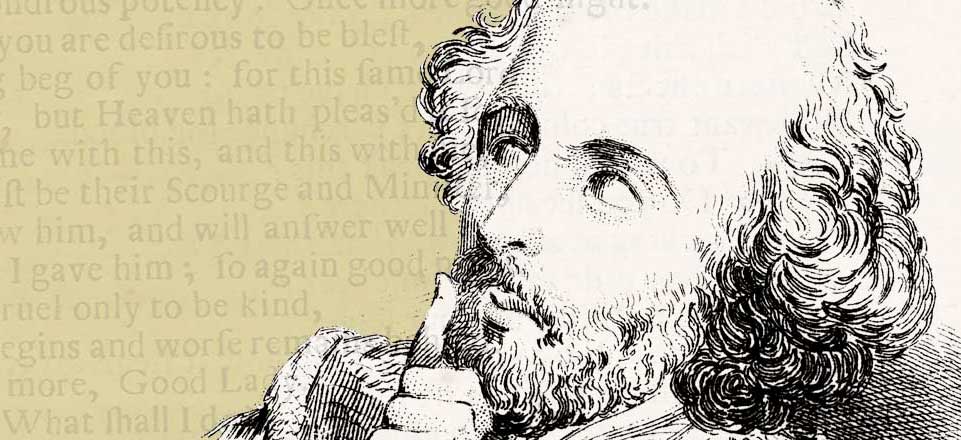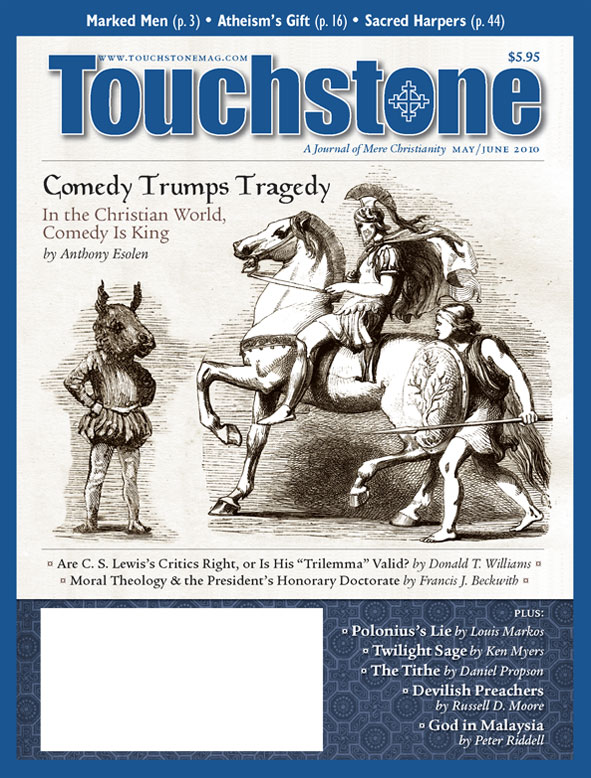View
Polonius’s Lie
Louis Markos on the Image of God & the Thine Own True Self
Poor William Shakespeare. For four centuries, over-eager readers have wanted to pin down the bard as a sensualist or a moralist, a believer or a skeptic, an idealist or a cynic, a materialist or a supernaturalist, a monarchist or a republican. And the list goes on.
A young man reads Macbeth’s words, “[Life] is a tale/ Told by an idiot, full of sound and fury,/ Signifying nothing,” and muses, “Will and I share the same bleak view of human existence.” Or a young girl savors every passionate word of the balcony scene in Romeo and Juliet and sees Shakespeare confirming her belief that romantic love excuses all impulsive and rash behavior. What these readers overlook is that Shakespeare himself does not speak these lines, but gives them to characters in particular contexts that militate against their being taken at face value.
Perhaps the most egregious error is made by the college student who discovers in a famous line from Hamlet the sacred formula for a happy life: “This above all: to thine own self be true.” Alas, many others besides the college student—a large percentage of Americans, I would submit—have taken these words to heart as a priceless gem of wisdom from the lips of the divine bard.
But, again, they are not spoken by Shakespeare. They are spoken by a pompous and obsequious courtier named Polonius, who tacks them on to the end of a rambling list of clichéd and hackneyed proverbs that have little or no influence on the object of his sermon: his rakish son Laertes. Polonius is by no means a figure through whom Shakespeare would offer good counsel on how to become a noble and virtuous person. On the contrary, Polonius, though not actively evil, stretches truth and justice on the rack of expediency and is not above using his daughter to further his position at court. In being true to himself, Polonius sets in motion the events that lead to the madness and suicide of his daughter, the death of his son, and his own ignominious murder.
As self-help gurus go, Polonius is a resounding dud; yet countless individuals, including Christians, persist in quoting his advice as the key to personal success. “To thine own self be true” has even become a justification for any word, thought, or deed that violates biblical standards.
East-of-Eden Advice
If Adam and Eve had resisted temptation and remained in the Garden, then Polonius’s advice would be thoroughly sound. Indeed, when Dante reaches the Garden of Eden that rests atop the mountain of Purgatory, Virgil, knowing that Dante has been purged of all remnants of the seven deadly sins, advises him to be true to himself in the most extreme way possible:
Your judgment now is free and whole and true;
To fail to follow its will would be to stray.
Lord of yourself I crown and mitre you.
(translator: Anthony Esolen)
Restored to his paradisiacal state, his heart and mind cleansed of all sin, Dante is now free to follow whatever impulse prompts him. He can no longer go off track, for his will is pure and responds as it should to the design of his Creator. He is now as God made him in the beginning, and Virgil is wholly justified in giving the advice he does.
But for a Christian clergyman or counselor to give this advice to an ordinary sinner would be foolishly naïve, criminally irresponsible, or borderline heretical. In our fallen state, the last thing we should do is follow our impulses. If we do, we will not find true happiness, but will bring down misery upon ourselves, our family, and our community.
Louis Markos , Professor in English and Scholar in Residence at Houston Baptist University, holds the Robert H. Ray Chair in Humanities. His 19 books include Lewis Agonistes; Restoring Beauty: The Good, the True, and the Beautiful in the Writings of C. S. Lewis; On the Shoulders of Hobbits: The Road to Virtue with Tolkien and Lewis; and From A to Z to Narnia with C. S. Lewis.
subscription options
Order
Print/Online Subscription

Get six issues (one year) of Touchstone PLUS full online access including pdf downloads for only $39.95. That's only $3.34 per month!
Order
Online Only
Subscription

Get a one-year full-access subscription to the Touchstone online archives for only $19.95. That's only $1.66 per month!
bulk subscriptions
Order Touchstone subscriptions in bulk and save $10 per sub! Each subscription includes 6 issues of Touchstone plus full online access to touchstonemag.com—including archives, videos, and pdf downloads of recent issues for only $29.95 each! Great for churches or study groups.
Transactions will be processed on a secure server.
more from the online archives
calling all readers
Please Donate
"There are magazines worth reading but few worth saving . . . Touchstone is just such a magazine."
—Alice von Hildebrand
"Here we do not concede one square millimeter of territory to falsehood, folly, contemporary sentimentality, or fashion. We speak the truth, and let God be our judge. . . . Touchstone is the one committedly Christian conservative journal."
—Anthony Esolen, Touchstone senior editor










